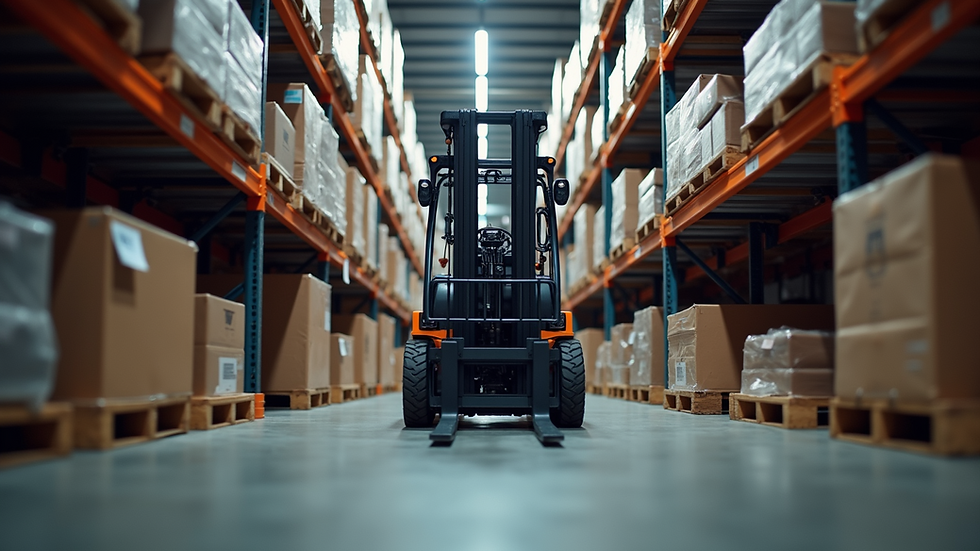How to Choose the Best Forklift Rental for Your Needs
- Michael Gray

- Jul 21, 2025
- 3 min read
When it comes to managing a warehouse, construction site, or distribution center, choosing the right equipment can make a significant difference. Forklifts are essential for lifting heavy loads and enhancing productivity. However, purchasing a forklift can be a substantial investment. Many businesses opt for forklift rentals to save money and ensure they have access to the right equipment when they need it. This guide will help you understand how to choose the best forklift rental for your needs.
Understanding Forklift Rental Guide
With numerous forklift options available on the market, selecting a rental service and the right model for your requirements can be challenging. It's crucial to understand that not all forklifts are the same—their designs cater to different applications, environments, and weight capacities.
Before diving into specifics, it's essential to assess your operational needs. Are you maneuvering in tight spaces? Do you require a vehicle that can function indoors and outdoors? Factors such as load capacity, lift height, and terrain will heavily influence your decision.

Key Factors to Consider
1. Load Capacity
One of the most critical specifications to consider is the load capacity of the forklift. Overloading a forklift can result in accidents and injuries, as well as damage to your products. Generally, forklifts vary in capacity from around 3,000 pounds to over 50,000 pounds.
After evaluating the loads you will regularly handle, consider selecting a forklift with a higher capacity than your maximum need to account for any fluctuations in operations.
2. Forklift Type
Different types of forklifts are designed for specific tasks:
electric forklifts: Ideal for indoor use, as they produce zero emissions and are quieter than diesel or propane forklifts.
internal combustion forklifts: More suitable for outdoor applications since they offer higher lifting power.
pallet jacks: Appropriate for low-weight items and tight spaces.
Consider where you will primarily be using the forklift and choose the type accordingly.

3. Rental Terms
Understanding the rental terms is crucial. There are typically several options to choose from:
Short-term rentals: Best for temporary projects or seasonal demands.
Long-term rentals: More cost-effective option for businesses that need a forklift for an extended period.
Do inquire about maintenance and repair policies, as well. A reliable rental company will handle maintenance issues promptly, ensuring you have minimal downtime.
How Much Does a Forklift Cost Per Hour?
The hourly cost of renting a forklift varies based on several factors, including the type of forklift, load capacity, and rental duration. On average, hourly rates for most forklifts can range from $15 to $30. However, specialized models may command higher rates.
Another aspect to consider is the additional costs associated with fuel or battery charging for electric models. For example, if you are using an electric forklift, you may need to factor in the cost of electricity.
Additionally, be sure to ask the rental company about any extra charges for delivery or pickup of the equipment, which can factor into the ultimate rental cost.

The Importance of Safety Features
When renting a forklift, ensure that it comes equipped with safety features. Safety should be a priority, especially when operating heavy machinery. Some critical safety features include:
Stability systems: These prevent tipping over while in use.
Operator protection: Features such as overhead guards and seat belts can keep the operator safe during operation.
Visibility aids: Mirrors or cameras can improve the operator's visibility, minimizing potential accidents.
Choosing a safe forklift helps protect your employees and your business, reducing the risk of costly accidents.
Evaluating Rental Companies
Once you have a clear idea of your forklift needs, it's time to evaluate potential rental companies. Look for companies that offer a variety of well-maintained equipment and exceptional customer service.
Read online reviews and ask for references. Make sure the rental company provides comprehensive options, including the right type of forklift for your operations, as well as accessible forklift rental services for ease of logistics.
Making Your Selection
After you have gathered all this information, you should have enough data to make an informed decision. Compare prices, consider the conditions of the rental agreements, and look at the overall quality of service.
Choosing the best forklift rental for your needs does not have to be complicating if you know what to look for. Equip yourself with thorough research and make a decision tailored to your specific requirements.

Using this guide, you can confidently select a forklift rental that caters to your operational needs while promoting employee safety and efficiency. By keeping these factors in mind, you'll find the right equipment to support your operations for years to come.




Comments